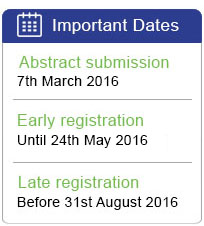Invited Speakers, 2
| 1 | 2 | 3 |
 |
Melanie Cooper is the Lappan-Phillips Professor of Science Education and Professor of Chemistry at Michigan State University. Her research has focused on improving teaching and learning in large enrollment general and organic chemistry courses at the college level. She is a Fellow of the American Chemical Society and the American Association for the Advancement of Science, and is a member of the National Research Council Advisory Board on Science Education (BOSE). She has received a number of awards including the ACS Award for Achievement in Research on Teaching and Learning in Chemistry (2014). She earned her B.S. M.S. and Ph.D. in chemistry from the University of Manchester, England. |
|
 |
Rachel Mamlok-Naaman (PhD) is the coordinator of the Chemistry Group at the Department of Science Teaching at the Weizmann Institute of Science, and the head of the Teaching Certificate program at the Weizmann Institute of Science. Until a few months ago – the head of the National Centre for Chemistry Teachers at the Weizmann Institute of Science in the last ten years. She is the coordinator of a special MSc program for chemistry teachers, and engaged in the development, implementation, and evaluation of new curricular materials, and research on students’ perceptions of chemistry concepts. In addition, she collaborates with science educators from all over the world, and coordinated a few projects in the framework of FP6 and FP7. Her publications are in the areas of teachers’ professional development, cognitive aspects of students’ learning, assessment, the nature of science, historical and philosophical aspects of science, and curriculum development. |
|
 |
Ton de Jong holds a chair in Instructional Technology at the University of Twente, the Netherlands. He specializes in inquiry learning and collaborative learning (mainly in science domains) supported by technology. He was coordinator of several EU projects and several national projects including the ZAP project in which interactive games/simulations for psychology were developed. ZAPs commercial licences now go over 80.000 in number. Currently he is coordinator of the 7th framework Go-Lab project on learning with online laboratories in science. He published over200 journal articles and book chapters, is currently associate editor for the Journal of Engineering Education and is on the editorial board of eight other journals. He has published papers in Science on inquiry learning with computer simulations (2006), design environments (2013), and virtual laboratories (2013). He is AERA fellow and was elected member of the Academia Europaea in 2014. For more info see: http://users.edte.utwente.nl/jong/Index.htm. |
|
 |
Koch Klemens, Pedagogical University of Berne, Fabrikstrasse 8, CH-3012 Bern, Switzerland Studies in Chemistry at the Université and the École polytechnique de Lausanne EPFL. |
|
 |
Martin Bílek is the professor at University of Hradec Králové (Czech Republic), Faculty of Science (Vice-dean for Development, Mobility and External Relations), Department of Chemistry (Head of Section for Chemistry Didactics). Graduated as teacher of chemistry and physics for secondary school at Faculty Education University of Hradec Králové (M. Ed., 1988), his Ph.D. in pedagogy/educational technology he received at Pedagogical Faculty of the Charles University in Prague (1996), Assoc. Prof. (habilitation, 1999) and Prof. (inauguration, 2006) in didactics of chemistry at Faculty of Natural Sciences of the M. Bel University in Banská Bystrica (Slovakia). His scientific and pedagogical activities are focused on didactics of natural sciences and technical subjects, especially chemistry (curricular approach, mind maps, learning from graphical presentation etc.) and ICT in science and technical education (computer supported class experiment, Internet in science and technical education, tutorial software, virtual and remote experimental activities etc.). He is member of many scientific, professional and editorial boards, societies and commissions. | |
 |
Sarah Hayes graduated from the University of Limerick in 2007 with a B.Sc. (Ed) in the Physical Sciences, and received her PhD in Science Education in 2011. post-primary school Physics and Chemistry teacher with many years of teaching experience. Sarah is currently responsible for the Education, Training and Outreach and Public Engagement activities at the Synthesis and Solid State Pharmaceutical Centre (SSPC) at the University of Limerick, and has held this role since August 2013. Sarah moved to the SSPC from a position as a lecturer in Science/Science Education in Mary Immaculate College. Prior to this Sarah worked in the University of Bremen, Germany as a Scientific Co-worker, in the University of Limerick as a post-doctoral researcher, and a Project Officer in the Physical Sciences in the National Centre for Excellence in Mathematics and Science Teaching and Learning (NCE-MSTL). Through her various roles Sarah has been involved in research, curriculum development and providing Continuous Professional Development courses with the focus on research informed best practice. Her most significant focus has been in the area of informal learning and engagement. She is also the chair of the steering committee of the Science Hub in Learning Hub Limerick and is also the chair and secretary of the Royal Society of Chemistry’s Chemical Education Research Group (CERG). | |
| 1 | 2 | 3 |

